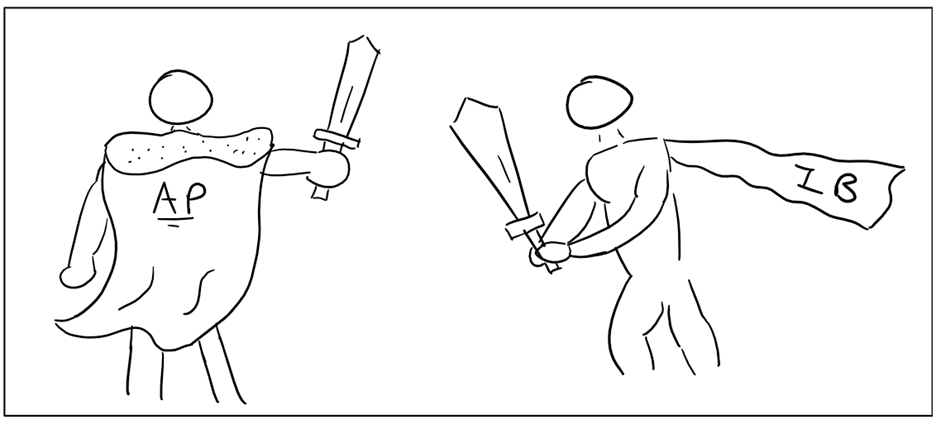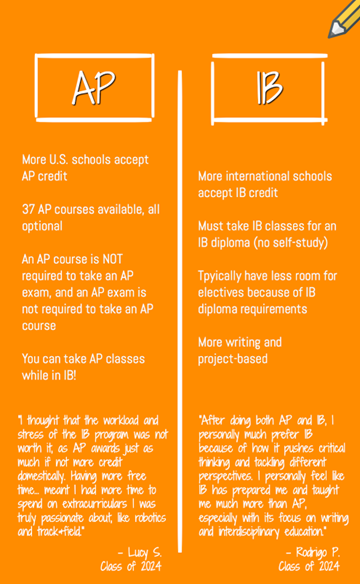By Hojoon Sung
One question you may face as you enter high school is whether it’s better to take AP courses or enroll in an IB program. AP, or Advanced Placement, is similar in concept to International Baccalaureate (IB), but the two experiences can be very different. Here’s what to know about both of them, and some advice when choosing which to take!
*Editor’s note: see another student story about Running Start and AP here.

College Credit
First thing’s first – let’s define “college credit.” College credits are points that count towards college graduation, similar to how you probably need at least 3 years of math, science, and English to graduate from high school. The more college credit you have before you enter college – this is where AP and IB exams come in – the fewer classes you have to take in college, and so the less you have to pay.
TLDR: Get college credit in high school!
What is AP?
AP courses are college-level classes taught in high school that can award college credit upon their completion. AP courses cover a variety of different topics (see this list for all of them) and culminate in a final exam in May. The score that you receive on your exam determines how much college credit you receive.
It’s important to know that both AP classes and exams are totally optional. You can choose to take the normal, not AP, version of a class, or if you’re in an AP class, you can choose not to take the AP exam. You can even choose to take an AP exam if you’re not in an AP class (though this is not something I would recommend). However, you must take the AP exam to receive college credit.
What is IB?
Like AP, IB awards college credit. However, unlike AP, IB is typically a 2-year long program. The IB program is divided into several subject areas that push critical thinking: studies in Language & Literature, Language Acquisition, Individuals & Societies, Sciences, Mathematics, and the Arts (see this page for more information on courses and exams). An IB diploma is like a badge of honor for your hard work, and it’s important because it shows you’ve both completed and passed the IB program, which is easier said than done.
Students also have the option to pursue the IB certificate, which allows them to choose which and how many IB classes they take (similar to AP). These classes can be one- or two-year courses depending on the individual class. At the end of the class students can choose to take the IB exam for potential IB credit. All public universities in Washington and Oregon are required to award college credit for IB exam scores of 4 (out of 7) or above.
It’s also important to know both AP and IB exams have an exam fee, about $98 for every AP exam and $76 for every IB exam. This may seem expensive, but considering how college courses usually cost hundreds of dollars, they are well worth the price.
In my school district, choosing between AP or IB is a big decision many students have to make, so here’s a T-chart highlighting some of the key differences. I’ve also included some of my friends’ rationale for why they chose one or the other, so hopefully this makes it easier for you to choose if you are stuck:

So, if you’re someone who wants to take lots of electives and have more choice in your schedule, taking AP classes may be the better choice for you. However, if you’re looking to apply to international schools for college or enjoy the projects and critical thinking of IB courses, IB could be more rewarding than AP.
It’s important to know that regardless of whether you choose to take AP or IB, the courses will be much more rigorous and challenging than normal-paced classes. Be prepared for lots of work and studying, mental fortitude is key. You’ve got this!
If you’re afraid of AP, or IB (or both), don’t fret! As someone who has taken multiple AP classes and has friends in IB classes, I can say that taking these difficult courses creates an extremely collaborative environment that makes the workload much more manageable. Sometimes, these moments of collaboration are some of the most special and defining moments of high school.
I would recommend anyone who has AP or IB classes offered at their school to take advantage of these opportunities. They help you stand out in college applications, and it can save you a lot of money.
A note about AP credits:
If you’re taking AP classes and planning to attend a four-year college (like me), it’s a good idea to research college-specific AP credit policies beforehand. Different schools have different policies for accepting AP credit, but here’s a general rule of thumb:
- Public colleges and universities generally accept LOTS of AP credit. Scores of 3-5 are all accepted and can help you skip intro-level classes; just make sure to consider that taking advanced courses from your freshman year of college can be difficult to manage.
- Private school policies vary, but many take less AP credit than public colleges and universities. Private colleges that do take AP credit often require scores of at least 4, and credit is only awarded to specific classes. For Ivy Leagues and other ultra-prestigious schools, AP credit is often not taken at all.
I hope you’ve found this blog helpful, and if you have any questions, feel free to reach out. 🙂
Sources:
- https://blog.prepscholar.com/international-baccalaureate-schools-in-us-complete-list
- https://www.bestcolleges.com/blog/ib-vs-ab-which-should-you-take/
- https://apstudents.collegeboard.org/course-index-page
- https://blog.prepscholar.com/the-complete-list-of-ib-courses-and-classes
***
Hojoon is a 2023-24 Ready WA Storyteller and a senior in Bellevue Public Schools.
Thank you to Beth Shoemaker, Kent-Meridian IB Coordinator, for sharing information about IB for this article.